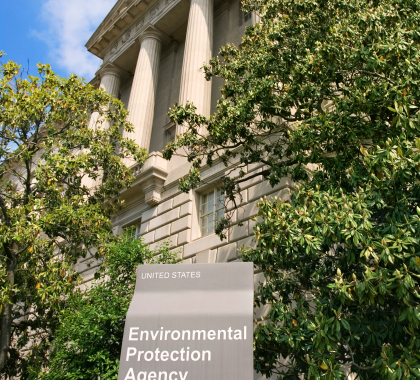Actions taken early in his first term by President Donald Trump indicate he intends to keep his campaign promises to reduce the power and funding of the Environmental Protection Agency (EPA) and shift the federal government’s focus from fighting human-caused climate change to improving the nation’s energy infrastructure.
Trump has said further developing domestic energy and cutting EPA red tape will add jobs.
‘Climate Propaganda’ Shutdown
Just minutes after Trump took the oath of office, all of former President Barack Obama’s energy and climate pages were removed from the WhiteHouse.gov website and archived. The Obama-era climate webpages were replaced with a page dedicated to “An America First Energy Plan.”
According to the plan, the Trump administration promises, among other things, “to eliminat[e] harmful and unnecessary policies such as the Climate Action Plan and the Waters of the U.S. rule. Lifting these restrictions will greatly help American workers, increasing wages by more than $30 billion over the next 7 years.”
Paul Driessen, a senior policy advisor to the Committee for a Constructive Tomorrow, says Trump was right to act quickly to remove Obama’s climate pages from the White House website.
“Shutting down the Obama climate propaganda website was absolutely the right thing to do,” said Driessen. “It reflected the ex-president’s determination to use climate scares to drive anti-energy, anti-economy policies.
“The Trump administration is focused on energy and climate reality, not scaremongering, and Trump’s ‘America First Energy Plan’ website reflects that focus,” Driessen said. “It is a breath of fresh air after eight long years of Obama acolytes using climate change to justify destructive energy, economic, and employment policies.”
Big Freeze
In a January 21 e-mail, Trump instructed EPA to freeze all grants and contracts. EPA has been awarding more than $4 billion in grants and assistance each year.
In addition, under Trump’s authority, White House Chief of Staff Reince Priebus issued a memorandum initiating a “regulatory freeze pending review,” affecting federal rules finalized in the last months of Obama’s presidency that have yet to take effect. The memorandum also directs federal agencies to refrain from sending new regulations to the Office of the Federal Register and to withdraw regulations yet to be published in the Federal Register.
The freeze gives the Trump administration time to review pending rules to ensure they reflect Trump’s policy priorities and comply with the laws under which they were enacted.
According to The Washington Post, the Obama administration issued similar orders upon taking office in 2009.
Prominent Environmental Regs Halted
Trump’s regulatory freeze includes at least 30 environmental regulations, including updated renewable-fuel requirements and increased energy-efficiency standards for portable air conditioners, walk-in coolers, and commercial boilers.
Jacki Pick, executive vice president of the National Center for Policy Analysis, says Trump’s actions are aimed at restoring Americans’ trust in government.
“Trump takes a critical view of the agencies with energy and environmental responsibilities,” said Pick. “His actions so far should give every American comfort that he is beginning a correction to restore the legal, constitutional order, by scaling back unlawful regulations.”
Restarting Pipeline Approvals
Trump signed presidential memoranda, which have the same force of law as executive orders, to restart and expedite completion of the Keystone XL and Dakota Access Pipelines on January 24.
In December 2016, Obama directed the U.S. Army Corp of Engineers to pull permits it had approved for construction of a segment of the Dakota Access Pipeline in North Dakota. In 2015, Obama rejected one segment of the Keystone XL Pipeline to show the United States was serious about reducing fossil-fuel consumption to fight climate change.
Trump’s memoranda do not reverse Obama’s denials; they instead encourage the companies, TransCanada and Dakota Access, to reapply for permits to complete the pipelines and direct the secretaries of the Army, State Department, and Department of the Interior to restart the approval process and review and approve the pipeline projects in an expedited manner, unless new evidence is presented showing why they should be denied.
James Rubin, a partner at the international law firm Dorsey & Whitney, says Trump’s pipeline orders were about resetting the process, not mandating particular results.
“While Trump’s orders concerning the Keystone and Dakota Access [Pipelines] focus on the different processes for making decisions, they seek the same result of expediting those processes, including by relying on existing environmental reviews,” Rubin said. “Significantly, although neither mandates a particular result, President Trump has said he supports both projects.
“The order on construction of the Keystone XL Pipeline maintains State Department’s delegated authority to make a ‘national interest’ determination,” said Rubin. “But the new order expedites the review by setting a 60-day deadline for the State Department to finish its review and deems the existing environmental review to fulfill the National Environmental Policy Act review requirement.”
‘Time to End Obstructionism’
Driessen says Obama blocked pipelines for ideological, not environmental, reasons.
“Despite the fact the Dakota and Keystone Pipelines went through long, arduous, detailed reviews, the Obama administration denied them on purely ideological grounds,” Driessen said. “The American people rejected those anti-fossil-fuel ideologies.
“The American people have spoken,” said Driessen. “It’s time to end the obstructionism and get down to business. Prompt action to terminate those delays is essential.”
Jacki Pick says Trump’s actions to expedite the pipeline approval process show he recognizes the critical role of infrastructure in the nation’s economic success.
“Trump understands that pipelines and other infrastructure are critical to the country’s continued superpower status,” Pick said. “He also knows simply getting government out of the way of infrastructure projects will nearly guarantee huge economic gains and jobs.”
H. Sterling Burnett, Ph.D. ([email protected]) is a research fellow at The Heartland Institute.





